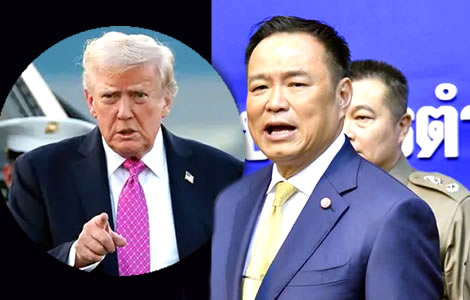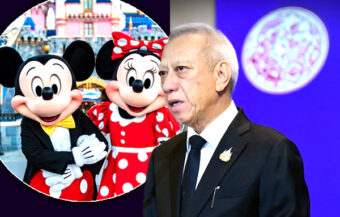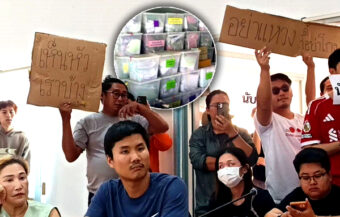Thai-Cambodia border crisis escalates as PM Anutin vows decisive action against incursions, reinforces troops, and sets strict conditions while President Trump pushes to broker a high-profile peace deal at the ASEAN Summit in Kuala Lumpur later this month.
The October 10th deadline to remove Cambodian families from Sa Kaeo Province is turning into a flashpoint for Prime Minister Anutin Charnvirakul, sparking a collapse in border talks with Cambodia. Troops are reportedly being sent to the area, raising the risk of open hostilities just as US President Trump demands both countries sign a peace deal at the ASEAN Summit in Kuala Lumpur at the end of October. Tensions are threatening to test Thai-Cambodian relations and even Thailand’s ties with the US in the coming weeks. On Wednesday, Anutin struck a defiant tone, dismissing Trump’s Nobel Peace Prize ambitions as irrelevant and signalling that the October 10th deadline will not budge — a far sterner stance than his earlier statements.

Prime Minister Anutin Charnvirakul is facing a foreign policy crisis just weeks into his tenure as Thailand’s 32nd PM. Tensions between Thailand and Cambodia are rapidly escalating. It comes as President Donald Trump pushes to broker a peace deal at the ASEAN Summit later this month in Kuala Lumpur.
According to four diplomatic sources, Trump expects to personally preside over the signing ceremony. It is tentatively scheduled between October 26 and 28 on the summit’s sidelines.
However, the situation on the ground has deteriorated in recent weeks — indeed, since Anutin came to power. Relations between Bangkok and Phnom Penh have sunk to new lows.
Thailand and Cambodia face rising tensions as border disputes threaten to escalate near Sa Kaeo
Thailand has ordered Cambodian families to vacate disputed territory in Sa Kaeo Province. These families, considered by Cambodia to be legal residents, were given until October 10 to leave. Yet Phnom Penh has rejected the ultimatum entirely.
Cambodia failed to comply with an earlier demand from the Royal Thai Army. That deadline, set for October 7, required Cambodia to submit an evacuation plan for its nationals. Instead, Cambodian authorities claimed the villagers are on Cambodian soil. This stance contradicts Thai assertions. Officials in Bangkok maintain that the land is within Thailand’s undisputed borders.
As a result, scheduled meetings of the Regional Border Committee (RBC) have been suspended. These meetings served as key mechanisms for resolving border tensions. Their cancellation signals a significant breakdown in diplomatic channels.
The families at the centre of this dispute are not new arrivals. They are part of a larger group of Cambodian nationals left over from decades of regional unrest. For years, they lived in the border zone under informal arrangements between Thai and Cambodian local authorities. These arrangements functioned with minimal friction — until now.
Peace shattered as July conflict killed dozens and former Thai prime minister was removed from office
The fragile peace shattered in May, but a particularly violent five-day conflict broke out in July. Between July 24 and 28, fighting broke out along the border, killing at least 43 people. The clashes shocked the region and triggered political chaos in Thailand. It began with the killing of an intruding Cambodian soldier by Thai forces on May 28 this year.
On July 28, US President Donald Trump was influential in bringing the hostilities to a de facto ceasefire. He leveraged US tariff negotiations to do so against both countries. Later talks took place in Malaysia, where a deal was signed.
One major casualty of the conflict was former Prime Minister Paetongtarn Shinawatra. She was ousted after Cambodian strongman Hun Sen leaked a private phone call. In that call, on June 15, Paetongtarn appeared to seek personal advice from Hun Sen, a longtime confidante of her father, ex-Prime Minister Thaksin Shinawatra. The leak embarrassed Paetongtarn and destroyed her credibility. She was removed from office for ethical violations shortly thereafter.
That power vacuum opened the door for Anutin Charnvirakul to ascend. Now, as prime minister, Anutin has adopted a far more aggressive stance toward Cambodia. His administration has shown little interest in compromise.
Thailand reinforces troops and sets strict terms for talks with Cambodia over disputed villages
Initially, there were hints of flexibility regarding the October 10 deadline. But those have been walked back. In fact, Thailand has sent more troops and personnel to the disputed villages — Ban Nong Ya Kaeo and Ban Nong Chan. Tensions there are running dangerously high.
On October 8, Prime Minister Anutin gave a press briefing at the Narcotics Suppression Bureau headquarters. He addressed reports that President Trump plans to mediate a peace deal. Anutin welcomed Trump’s interest but made it clear: Thailand will only negotiate under strict conditions.
He outlined four non-negotiable demands. First, all Cambodian troops and weapons must be withdrawn from the area. Second, intruders on Thai soil must be removed. Third, any dangerous items must be cleared from the zone. Fourth, all operations must adhere to international legal standards.
“If these four points are respected,” Anutin said, “Thailand is ready to negotiate. But we will never accept an invasion of our sovereignty.”
Anutin stresses Thai sovereignty first and warns Cambodia of decisive action if deadline is ignored
Significantly, he emphasised that Thailand was attacked first. Therefore, in his view, the burden of compliance lies squarely with Cambodia. He warned that if the October 10 deadline passes without compliance, Thailand will respond forcefully. Anutin also claimed to have a complete contingency plan in place.
While Trump wants a peace photo-op, Thailand is preparing for war. Sources say US officials made the signing ceremony a condition for Trump’s appearance at the summit. Washington also reportedly asked organisers to exclude Chinese officials from the event. The White House is clearly positioning the summit as a showcase for Trump’s diplomatic credentials.
This is not just a matter of regional politics. The United States recently imposed steep tariffs — between 10% and 40%— on Southeast Asian goods. ASEAN member states, including Thailand and Cambodia, hope to use the summit to negotiate better terms. Trump’s peace push is therefore seen as part of a larger strategy. He aims to present himself as a global statesman while seeking a Nobel Peace Prize.
Trump aims to claim global peacemaker status by adding Thailand and Cambodia to his achievements
So far, he claims to have resolved seven global conflicts since returning to office in January. He now wants to add Thailand and Cambodia to that list.
However, serious obstacles remain. Although a signed ceasefire was brokered by Malaysian Prime Minister Anwar Ibrahim on August 7, at least one skirmish followed. This raises questions about the commitment of both sides. On the ground, border tensions remain high, and nationalist rhetoric is growing louder in both countries.
Moreover, Thailand’s new government is pushing to scrap decades-old Memorandums of Understanding with Cambodia. These MOUs formed the legal backbone of Thai-Cambodian cooperation for over 20 years. Their proposed cancellation would mark a sharp break with past diplomatic practice.
The Bhumjaithai Party is behind this move. Anutin’s party is using the Cambodia issue to galvanise nationalist sentiment ahead of elections expected in March 2026. But this strategy carries risk.
Thai foreign ministry veteran warns against hasty cancellation of decades-old agreements
Even Anutin’s Foreign Minister, a veteran diplomat, Sihasak Phuangketkeow, has warned against moving too quickly. He urged caution on cancelling the MOUs or holding a referendum on them alongside a national vote. He pointed to recent polling data: 68% of Thai citizens do not understand the MOUs. However, 60% still favour a referendum and their termination.
Sihasak suggested that cancelling the MOUs could weaken Thailand’s diplomatic position. Despite this, the Anutin government appears determined to move forward. The prime minister has shown no sign of backing down.
When asked about Cambodia’s decision to nominate Trump for the Nobel Peace Prize, Anutin was blunt. “That has nothing to do with us,” he said. “Whoever wins the prize, we congratulate them. But I act only for Thailand’s benefit.”
His message was unequivocal: Thailand’s sovereignty is not up for negotiation. Any breach of Thai territory after October 10 will be met with decisive action. Legal and military protocols are already in place. Thailand has conducted internal readiness drills and updated operational plans.
ASEAN summit looms as world leaders gather and Thai-Cambodian tensions clash with trade negotiations
Meanwhile, the ASEAN Summit looms large. Besides Trump, several major world leaders are expected to attend, including Chinese Premier Li Qiang, Indian Prime Minister Narendra Modi, Brazil’s Luiz Inácio Lula da Silva, and South Africa’s Cyril Ramaphosa.
Each ASEAN country is expected to seek individual meetings with Trump. Their goal: negotiate relief from punitive tariffs that threaten to stifle regional growth. Economists warn that if trade restrictions persist, Southeast Asia could face a slowdown. Export-driven economies are especially vulnerable.
Despite this, the proposed peace ceremony remains in limbo. One source close to the ASEAN secretariat stated: “It’s potentially happening, yes. But it’s not finalised. It depends on Thailand.” Trump wants to be seen as the architect of peace, but real agreement is elusive.
Significantly, Trump is reportedly anxious that China be excluded from this process.
Border tensions remain unresolved as nationalist pressures rise and both militaries stay on high alert
Even if Thailand agrees to talks, the underlying dispute remains unresolved. Both sides continue to blame each other. Thai military leaders say Cambodia instigated the July hostilities. Cambodian officials, on the other hand, claim Thai forces provoked them. With no independent verification, the truth remains murky.
Nationalist groups in both countries are fueling the fire. In Thailand, ultranationalist groups are pressuring Anutin to hold firm. In Cambodia, similar voices are demanding no territorial compromise.
Field reports suggest that both militaries remain on high alert. Reinforcements continue to arrive near the border. Armoured vehicles and heavy artillery have been seen moving through Sa Kaeo Province. Civilian access to certain areas has been restricted.
Local residents report growing fear and uncertainty. Some villages have begun stockpiling food and fuel in case fighting resumes. Others have temporarily relocated, fearing a second conflict could erupt without warning.
Anutin ties political future to hardline defence as ASEAN summit could mark peace or renewed conflict
This is the combustible backdrop to Trump’s peace plan. Whether he can deliver a deal remains to be seen. But what is clear is that Anutin is not bluffing. He has tied his political future to a tough, nationalistic defence of Thai sovereignty.
Steely new line being taken as Thailand toughens its Cambodian border posture. Families ordered out
Khmer soldier killed in deadly gunfire between Thai and Cambodian armies near Ubon Ratchathani
Tensions flare on Cambodian border at Sa Kaeo with locals herded by officials to confront Thai soldiers
The coming days are critical. October 10 marks the deadline for Cambodia to respond. If they do not comply, Thailand has made its intentions clear. Military action remains on the table.
The ASEAN Summit in Kuala Lumpur could either mark a diplomatic triumph or a flashpoint for renewed conflict. Either way, the stakes are high — for Thailand, for Cambodia and for Trump’s international ambitions and legacy.
Join the Thai News forum, follow Thai Examiner on Facebook here
Receive all our stories as they come out on Telegram here
Follow Thai Examiner here
Further reading:
Steely new line being taken as Thailand toughens its Cambodian border posture. Families ordered out
PM confirms government’s referendum plan to scrap MOUs with Cambodia. Top People’s Party MP shocked
Leader of deadly scam gang in Cambodia and henchmen still at large with 4 more Thais arrested
Police in Cambodia close in on fake scam loan app leadership after family murders in Samut Prakan
Cambodian cybercrime industry run by Chinese criminals could be generating up to 38% of its GDP
Debt and ฿1.7 million loss to scammers drive man to murder his wife and two sons in Samut Prakan
Loan shark arrested in Nonthaburi for bullying a borrower charged an annual interest rate of 730%
Bank of Thailand to tackle household debt in new plan from 2024 which will see higher standards


















